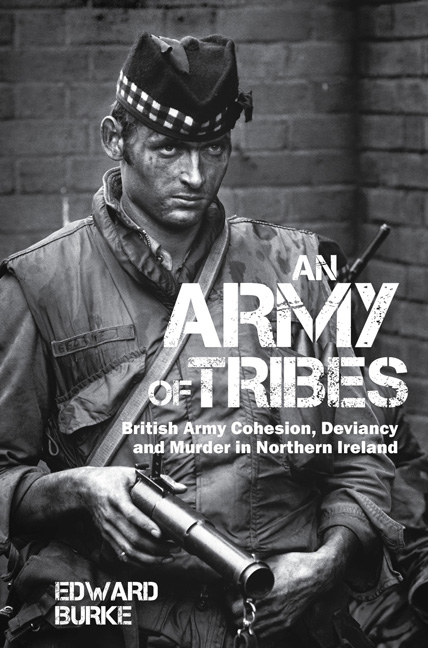Book contents
- Frontmatter
- Contents
- Preface
- Acknowledgements
- List of Abbreviations
- Maps
- Introduction
- 1 The British Army Before 1971
- 2 The Political and Operational Environment in Northern Ireland, 1969–1972
- 3 The Scots Guards and Argyll and Sutherland Highlanders Regiments in Northern Ireland, 1971–1972
- 4 Murder: The Killing of Michael Naan and Andrew Murray
- Conclusion
- Bibliography
- Index
1 - The British Army Before 1971
- Frontmatter
- Contents
- Preface
- Acknowledgements
- List of Abbreviations
- Maps
- Introduction
- 1 The British Army Before 1971
- 2 The Political and Operational Environment in Northern Ireland, 1969–1972
- 3 The Scots Guards and Argyll and Sutherland Highlanders Regiments in Northern Ireland, 1971–1972
- 4 Murder: The Killing of Michael Naan and Andrew Murray
- Conclusion
- Bibliography
- Index
Summary
Many of us who grew up used to seeing the map painted red and thinking a quarter of the globe as ‘our Empire’ find it hard to adjust ourselves to Britain's loss of material power and diminished status … We shudder at references to ‘mini’ Britain, and are appalled at the apathy which has grown as our power has waned.
An Imperial Institution in a Domestic Setting: Purpose and Identity
In the 1960s, the British Army came home. After the withdrawal from Malaya, Borneo, Aden, Uganda, Sudan, Nigeria etc. there was precious little to garrison in Asia and Africa and an escalating threat to Europe from the Soviet Union. Britain was experiencing major cultural and social changes, including rapid rates of immigration and the growth of pacifist movements linked to demands for gender equality. The Army had deployed on 64 different campaigns, of varying duration and scale, between 1945 and 1970 – more than 1,800 soldiers were killed and 5,200 wounded during this period. But the ‘successes’ of Malaya and Kenya were generally uninteresting to the general public since the result was the same – withdrawal, albeit a better ordered one. The empire was all but finished; overseas career opportunities were greatly reduced and the Army struggled to recruit enough young officers to fill vacancies. The years of peacetime conscription or National Service (1949–1963) meant that many in Britain came to view the Army as something to be avoided, or endured, instead of a desirable career choice or a public institution accorded a high level of social prestige. For a period, many regiments became increasingly reliant for officer recruits on those military and/ or aristocratic families that traditionally valued military service (such as the Leasks or Erskine-Crums for the Scots Guards and the Youngers or Grahams for the Argylls). The Army became isolated from wider British society to a degree unprecedented for many decades.
The implosion of Northern Ireland from 1969 to 1971 focused military minds – and gave them an immediate task. A declining empire and the end of conscription meant a significantly smaller military; the total number of personnel in the armed forces had been reduced by more than a third in just over a decade (down from 703,900 in 1957 to 383,000 in 1969. The Army had been whittled down to 50 British and five Gurkha battalions).
- Type
- Chapter
- Information
- An Army of TribesBritish Army Cohesion, Deviancy and Murder in Northern Ireland, pp. 33 - 62Publisher: Liverpool University PressPrint publication year: 2018



